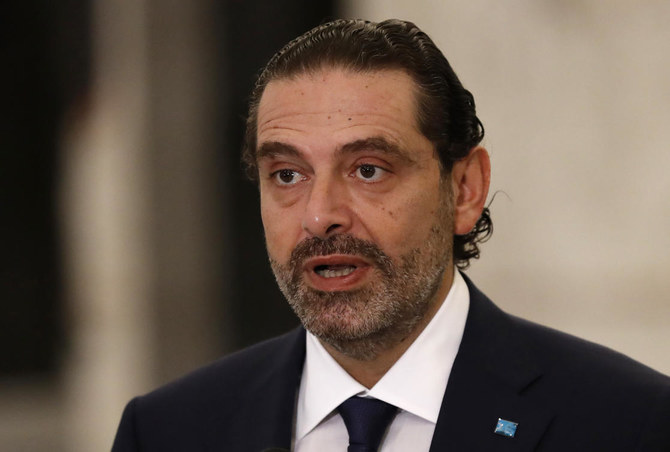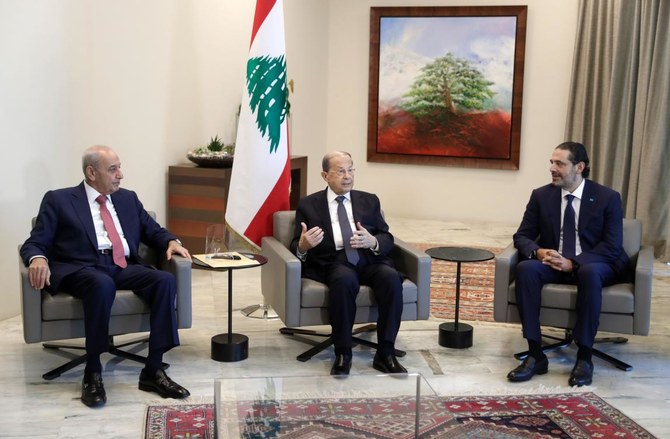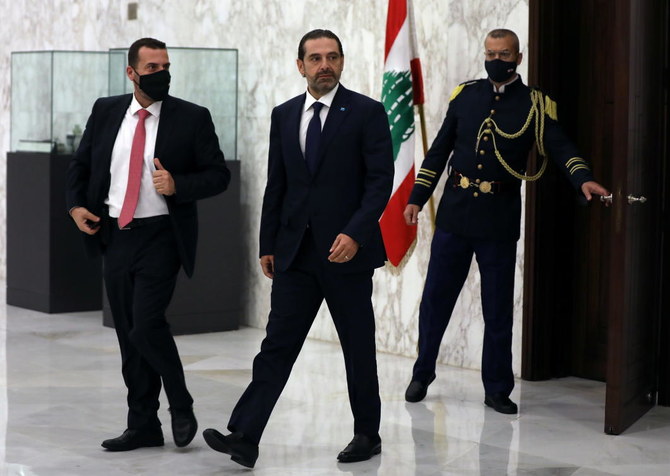BEIRUT: Lebanese President Michel Aoun assigned on Thursday former Prime Minister Saad Hariri to form the country’s next government, after 65 members of Parliament named Hariri during binding parliamentary consultations.
Hariri’s assignment led to a significant drop in the dollar’s exchange rate on the black market to 6,800-6,900 Lebanese pounds.
Addressing the people of Lebanon from the Baabda Palace, Hariri stressed that he would “form a government of non-partisan technocrats to implement the economic, financial, and administrative reforms contained in the French initiative. The parliamentary blocs pledged to support the government in the implementation of this initiative.”
Hariri said: “I am determined to keep my promise for the people to stop the collapse that threatens our economy and rebuild what has been destroyed by the horrible Beirut port blast.”
A gigantic explosion in August in Beirut’s port, caused by chemicals stored in a warehouse there, has compounded the economic crises. The blast decimated the capital, killing nearly 200 people, and injured over 6,000.
The explosion prompted France, a longtime ally and Lebanon’s former colonial ruler, to push for a new political order in Lebanon. Paris launched what came to be known as the French initiative, designed to pressure rival politicians into reaching an agreement on a government empowered to introduce wide-ranging economic reforms. The international community has said it will not help Lebanon financially before reforms are implemented.
Hariri announced that he would focus on forming a government quickly “because time is running out, and this is the last opportunity.”
He said non-binding parliamentary consultations would start on Friday afternoon to hear the opinions of the MPs.
Hariri made phone calls to former premiers Salim Hoss, Najib Mikati, Fouad Siniora, Tammam Salam, and Hassan Diab. And he declared that telephone consultations with them were sufficient for “security-related reasons.”
The Free Patriotic Movement bloc, headed by Gebran Bassil, did not name Hariri during the parliamentary consultations.
Bassil insisted in a statement: “After the nomination of Hariri, we expect a techno-political government.”
Parliament’s Speaker Nabih Berri tried to mitigate the impact of the disagreement between Hariri and Bassil regarding the forming of the next government. Berri said after meeting with Aoun: “The atmosphere is positive between Aoun and Hariri, and there will be a rapprochement between the Future Movement and the Free Patriotic Movement.”
The Future Movement’s supporters in Tripoli received Hariri’s reassignment by firing weapons into the air, damaging private property and injuring several people.
It said in a statement: “A new chapter has begun, to rescue the country, stop the collapse, and rebuild what was destroyed in the Beirut port explosion. In view of this, we call on the supporters of the movement in all regions to maintain the same spirit as they follow what happens after the assignment and to abide by the law.”
Nassib Ghobril, head of the Economic Research and Analysis Department at Byblos Bank, said: “The assignment is the first step but it is not sufficient as there is no confidence on the citizens’ part.
“The markets and the private sector, as well as citizens, want to see practical measures on the ground to be assured that there is resoluteness in addressing the country’s economic, financial, monetary, and living situations,” he added.
Syndicate of Money Changers Head Mahmoud Murad said: “Things are developing rapidly. The dollar’s exchange rate has fallen below 7,000 Lebanese pounds after it ranged between 7,000 and 8,000 Lebanese pounds for months, and we do not know how further it would drop.”
He added: “Some people are currently selling their saved dollars, while others want to buy dollars. No one knows the ceiling of this activity — it depends on political developments and how they reflect on the public.”
Addressing the Lebanese people, UN Special Coordinator for Lebanon Jan Kubis said: “Do not count on miracles, foreign elections or external donors — the rescue must start in Lebanon, by Lebanon.”
He said in a tweet after the assignment of Hariri: “No country, especially Lebanon, in a catastrophic free fall can survive endlessly without an effective pro-reform government as the only way to start rescuing the country and its people from further collapse, from chaos and extremism.”
He added: “It is the traditional political forces that have again put on themselves to choose the way forward, regardless of their numerous failures in the past and deep skepticism about the future. It is up to them to help Saad Hariri, the designated PM, to rapidly create an empowered, action-oriented government, to start delivering the well-known reforms.”
On the eve of the binding parliamentary consultations, Jean-Yves Le Drian, France’s minister of Europe and foreign affairs, urged Lebanon to “speed up” the formation of the government.
“The later we are, the further the boat sinks,” he told the French Senate’s Committee for Foreign Affairs. “If Lebanon does not implement the required reforms, the country itself is in danger of collapse, and the Lebanese people cannot be the victim of the negligence and incompetence of their leaders. Long-standing disputes and quotas according to affiliations and sects have returned, but the current situation does not allow that.”
There were some surprises during the binding parliamentary consultations. The Syrian Social Nationalist Party bloc named Hariri to head the government, despite the fact that the party had previously decided not to name Hariri.
The Hezbollah bloc refrained from naming Hariri. The head of the bloc, Mohammad Raad, said: “Refraining from naming anyone may contribute to maintaining a positive atmosphere that broadens the required understanding.”
This was in reference to the fact that Hezbollah stands with its ally, the Free Patriotic Movement, which did not name Hariri. The leadership and MPs of Hezbollah had previously announced their desire for Hariri’s return to head the government.
MPs Jihad Samad and Adnan Trabelsi, meanwhile, deviated from the decision of the Consultative Meeting bloc and named Hariri. MP Nohad Machnouk, too, named Hariri despite the political dispute between the two. Machnouk had been expected to either refuse to name Hariri or be absent from the consultation.
MP Jean Talouzian deviated from the decision of the Lebanese Forces bloc and also named Hariri. The bloc did not name anyone to head the government despite its commitment to the French initiative.





















